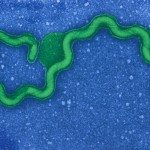Lien vers Pubmed [PMID] – 26437456
PLoS Negl Trop Dis 2015 Oct;9(10):e0004097
Leptospirosis essentially affects human following contact with rodent urine-contaminated water. As such, it was mainly found associated with rice culture, recreational activities and flooding. This is also the reason why it has mainly been investigated in temperate as well as warm and humid regions, while arid zones have been only very occasionally monitored for this disease. In particular, data for West African countries are extremely scarce. Here, we took advantage of an extensive survey of urban rodents in Niamey, Niger, in order to look for rodent-borne pathogenic Leptospira species presence and distribution across the city. To do so, we used high throughput bacterial 16S-based metabarcoding, lipL32 gene-targeting RT-PCR, rrs gene sequencing and VNTR typing as well as GIS-based multivariate spatial analysis. Our results show that leptospires seem absent from the core city where usual Leptospira reservoir rodent species (namely R. rattus and M. natalensis) are yet abundant. On the contrary, L. kirschneri was detected in Arvicanthis niloticus and Cricetomys gambianus, two rodent species that are restricted to irrigated cultures within the city. Moreover, the VNTR profiles showed that rodent-borne leptospires in Niamey belong to previously undescribed serovars. Altogether, our study points towards the importance of market gardening in maintain and circulation of leptospirosis within Sahelian cities. In Africa, irrigated urban agriculture constitutes a pivotal source of food supply, especially in the context of the ongoing extensive urbanization of the continent. With this in mind, we speculate that leptospirosis may represent a zoonotic disease of concern also in arid regions that would deserve to be more rigorously surveyed, especially in urban agricultural settings.

